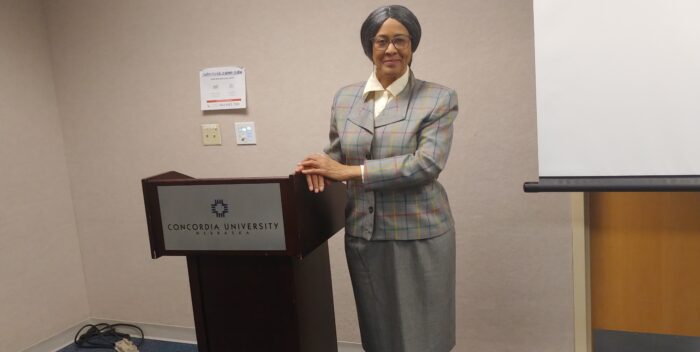Actress Sherrie Tolliver brings Rosa Parks portrayal to Concordia Nebraska’s campus
Sherrie Tolliver, dressed as Rosa Parks, poses by the podium in Thom Auditorium.
Photo credit: Josiah Horvath
By Josiah Horvath
Actor and history interpreter Sherrie Tolliver brought her rendition of Rosa Parks to campus and also spent time talking with students and faculty about the civil rights icon and how she goes about developing her presentations.
Tolliver’s appearance was sponsored by the Looking Beyond speaker series, through an ongoing gift from the Martin and Regina Maehr family, and the Enhancing Multicultural Experiences gift account of Gail Clarke-Smith. Tolliver is part of the Women in History Ohio, which focuses on retelling stories of various notable women in history.
Tolliver visited Trinity Academy, Concordia Nebraska’s on-campus high school to talk with students. Concordia freshman Lorelei Humphrey also went to the campus-wide presentation.
“Rosa Parks didn’t read about the historical events, she lived through them,” said Humphrey, “and thanks to a little suspension of reality she’s here to tell you about it.”
Parks, sometimes called the “mother of the Civil Rights movement,” refused to give up her seat on a bus in Montgomery, Alabama, in 1955, sparking the Montgomery Bus Boycott and leading to integration of public transportation in the city. She lost her job and was jailed for actions but as Tolliver said when she portrayed Parks, “I’m very shy.”
“You would not know that because of things I’ve done in my life,” Tolliver, as Rosa Parks, said. “But I did them because of my courage and conviction, not because I wanted to be out talking to people like I’m talking to you now. It took me a long time to be comfortable doing this.”
A common misconception of Parks is that she was “the tired seamstress who refused to give up her seat on a segregated bus because her feet hurt— A woman who accidentally made history,” Tolliver said.
But the reality was a more complex narrative.
“I was determined that the next time a bus driver asked me to give up my seat, I would refuse,” said Tolliver as Parks. “The reason I did that goes all the way back to my childhood.”
When Parks was a young girl when she was pushed by a white boy and she pushed back in response. The boy ran home and told his mother, who threatened to have Parks thrown in jail.
“And I said, ‘Well, he pushed me first.’ So, my grandmother apologized and apologized. When the lady left with the little boy, she scolded me worse than she ever scolded me,” she said. “You can’t talk to white folks like that. You’ll get killed.”
Parks married Raymond Parks at the age of 19. He was a barber and civil rights activist. Because of her husband, she became the secretary of the Montgomery branch of the National Association for the Advancement of Colored People, which today is the oldest and largest civil rights organization.
Tolliver also gave a slide presentation about the many individuals involved in the civil rights effort, both Black and white and women and men. They included Sojourner Truth, Harriet Tubman, Ida B. Wells, Elizabeth Jennings Graham, Charlotte Brown and Mary Ellen Pleasant.
“Somebody gave me a T-shirt that has a Rosa Parks picture on it that says one person can make a difference. I’m like, no, no it wasn’t one person. It wasn’t,” Tolliver said. “It was many people doing many things. And finally there was this convergence, this perfect storm.”
Humphrey said she was struck by how courageous Rosa Parks and all others involved were in those time. “They faced intense challenges—jail, bombs going off in their homes, losing jobs, and much more,” she said.
Professor Tobin Beck, chair of the English, Communication and Theatre Arts Department and a member of the Concordia Speakers Committee, said Tolliver gave a “powerful performance”, bringing Rosa Parks to life.
“She portrayed a woman who made great contributions to the Black struggle for civil rights, and she showed how that struggle involved a wide range of people who got involved out of a strong sense that it was the right thing to do,” Beck said.




















